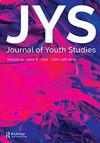An older age colored by youth: the continuing significance of youth-generated cultural boundaries for Sixties affiliates
IF 2.2
3区 社会学
Q1 SOCIAL SCIENCES, INTERDISCIPLINARY
引用次数: 0
Abstract
ABSTRACT This article uses 14 in-depth interviews with individuals who felt involved with and were young during what is commonly known as ‘the Sixties’ in America to explore the potential relevance of youth-generated boundaries for now even older age. Analyzed data are focused upon informants’ subjective identifications and life course understandings as among a specific, though highly relevant section of the first generation to have now lived more complete lives inside Western post-World War 2 cultural transformations, in which the experience of youth and passage to adulthood became reshaped for many. Interviews show a continued significance of youth-generated boundaries around aging, parent culture, and conventional adulthood informants attribute to the Sixties that influence how they conceptualize their current self, peers, and understand social generations generally. We argue our data extend recent research from youth (sub)cultural studies on how subjective youth cultural connections can configure eventual adulthoods to the latter phases of life. Generally, where we do detect youth-generated boundaries as shaping aspects of how sampled Sixties affiliates profess to be looking ahead to later life, findings suggest a complexified corresponding older age containing newer types of markings and subjective experiences might be emerging that merit empirical consideration beginning with this generation.一个被年轻人染上颜色的老年:年轻人产生的文化边界对60年代附属机构的持续意义
摘要本文对那些在美国通常被称为“六十年代”的年轻人进行了14次深入采访,以探讨年轻人产生的界限对现在甚至更大年龄的潜在相关性。分析的数据集中在线人的主观认同和对人生历程的理解上,这是第一代人中的一个特定的、尽管高度相关的部分,他们现在在二战后的西方文化转型中过着更完整的生活,在这一转型中,许多人的青年经历和成年经历都被重塑了。采访显示,年轻人围绕老龄化、父母文化和60年代的传统成年界限仍然具有重要意义,这些界限影响了他们对当前自我、同龄人和对社会世代的总体理解。我们认为,我们的数据扩展了青年(亚)文化研究的最新研究,即主观的青年文化联系如何将最终的成人行为配置到人生的后期。总的来说,当我们确实发现年轻人产生的界限是60年代抽样分支机构如何展望未来生活的塑造方面时,研究结果表明,可能正在出现一个包含新类型标记和主观经验的复杂的相应老年,值得从这一代人开始进行实证考虑。
本文章由计算机程序翻译,如有差异,请以英文原文为准。
求助全文
约1分钟内获得全文
求助全文
来源期刊

Journal of Youth Studies
SOCIAL SCIENCES, INTERDISCIPLINARY-
CiteScore
5.00
自引率
10.50%
发文量
82
期刊介绍:
Journal of Youth Studies is an international scholarly journal devoted to a theoretical and empirical understanding of young people"s experiences and life contexts. Over the last decade, changing socio-economic circumstances have had important implications for young people: new opportunities have been created, but the risks of marginalisation and exclusion have also become significant. This is the background against which Journal of Youth Studies has been launched, with the aim of becoming the key multidisciplinary journal for academics with interests relating to youth and adolescence.
 求助内容:
求助内容: 应助结果提醒方式:
应助结果提醒方式:


